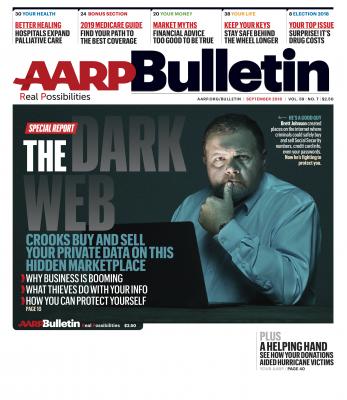Convicted scammers reveal how your private info gets bought and sold by criminals at hidden websites
WASHINGTON, DC—Information stolen in computer breaches of well-known companies is flooding into an underground digital market called the Dark Web, where criminals buy and sell Social Security numbers, credit card information and computer passwords to be used for fraud, an investigation in the September issue of AARP Bulletin reveals. Using software originally developed by the U.S. Navy and available for free to anyone who wishes to download it, criminals buy and sell private data with complete anonymity, then use it to commit identity fraud. Approximately 6.6 percent of U.S. adults were victimized last year, the report shows, and allegedly, more than half of Americans’ Social Security numbers are for sale for as low as a few dollars each. The article also details how identity fraud typically occurs, and the many proven, powerful ways consumers can protect themselves.
Other stories in the September issue:
In the News
- When Loved Ones Steal: Recent reports of loved ones who have financially exploited their high-profile, older relatives highlights the fact that all families need to know how best to protect themselves. With advice that ranges from making a plan to designate power of attorney to setting up direct deposit for checks, this article details how to protect yourself and your family from financial exploitation from close friends and family.
- The Election and Drug Prices: With the average retail price of prescription drugs for chronic conditions reaching $13,000 annually, it’s a topic high on voters’ minds. AARP outlines several ways to address high drug prices, including proposals to give Medicare the power to negotiate prices, allow safe importation of less-expensive drugs, expand access to generics, eliminate pharmacy gag clauses, increase price transparency and continue state legislative momentum.
Health
- Same Doctor, Better Life: Loyalty may have an upside if you're contemplating switching doctors. Find out why sticking to one physician may help you live longer.
Money
- Your Medicare Checklist: AARP provides an in-depth questionnaire that helps seniors select the best coverage during open enrollment, Oct. 15-Dec. 7. These 15 questions make it easy for readers to understand how their care, coverage and budget are interconnected and can help them decide the best Medicare options.
- 7 Ways Medicare is Getting Better: AARP examines seven changes to Medicare for 2019 designed to make the system better. The changes include: closing the Medicare Part D doughnut hole, repealing the cap on physical, speech or occupational therapy services, providing better information to help enrollees compare cost and coverage options between traditional Medicare and Medicare Advantage, covering telehealth services along with meals, transportation and home-safety improvements, paying for in-home aides, and allowing people to “test drive” plans.
# # #
About AARP
AARP is the nation’s largest nonprofit, nonpartisan organization dedicated to empowering people 50 and older to choose how they live as they age. With a nationwide presence and nearly 38 million members, AARP strengthens communities and advocates for what matters most to families: health security, financial stability and personal fulfillment. AARP also produces the nation's largest circulation publications: AARP The Magazine and AARP Bulletin. To learn more, visit www.aarp.org or follow @AARP and @AARPadvocates on social media.
For further information: Paola Torres, AARP, 202-434-2555, ptorres@aarp.org
































































